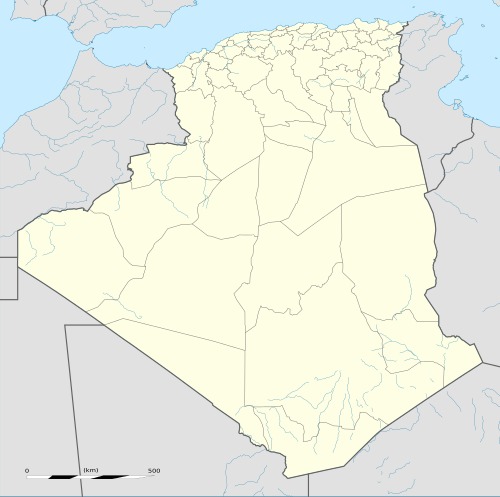Historical Background of Algeria and France
The historical relationship between Algeria and France is marked by a complex and significant past that has shaped both nations. Algeria, a North African country, was part of the French colonial empire for over 130 years, beginning in 1830 and ending with independence in 1962. During this period, France exerted extensive political, economic, and cultural influence, leading to profound social changes and conflicts. The struggle for independence was marked by a fierce and prolonged war, which left lasting scars and significantly impacted the identities and relationships of both countries. Understanding this background provides essential context for exploring the ongoing connections and dynamics between Algeria and France today.
Early Interactions and Colonial Foundations
The historical relationship between Algeria and France is marked by early interactions that eventually led to colonization, shaping the political and cultural landscape of both nations. These interactions began during the period of European expansion and exploration, with France establishing a presence in North Africa in the 19th century, culminating in the formal colonization of Algeria in 1830. The colonial foundations set by France had profound and lasting impacts on Algerian society, economy, and identity.
- Initial Contact and Exploration: French interest in North Africa increased during the 17th and 18th centuries, driven by trade, strategic concerns, and the desire to expand their empire. French explorers and traders established early relations with local communities in Algeria.
- French Conquest of Algeria: In 1830, France launched a military expedition, leading to the conquest of Algiers and subsequent colonization. This marked the beginning of a 132-year colonial rule characterized by the establishment of French administrative structures, settlement policies, and economic exploitation.
- Colonial Administration and Impact: French rule deeply influenced Algerian society through dispossession of land, efforts to impose French culture and language, and the suppression of local traditions and resistance movements. Colonization also transformed Algeria’s economy, integrating it into the French imperial system.
The Conquest of Algeria (1830)
The historical background of Algeria and France is marked by a complex and often tumultuous relationship shaped by colonization, conflict, and eventual independence. Algeria, located in North Africa, was an Ottoman territory before becoming a French colony in the 19th century. France’s imperial ambitions led to the conquest of Algeria, which began with the invasion in 1830. The conquest was driven by France’s desire for economic expansion, strategic dominance, and national prestige. The initial military campaign resulted in widespread resistance from Algerian tribes and leaders, who fought fiercely to maintain their independence. Over the next several decades, France established control through military suppression, colonization, and the exploitation of Algeria’s resources. This period saw the transformation of Algeria into a settler colony with a significant French population and economic infrastructure. The conquest of Algeria in 1830 marked the beginning of a colonial era characterized by cultural clashes, social upheavals, and resistance movements, culminating in Algeria’s struggle for independence in the mid-20th century. The legacy of this colonial period profoundly influences the relationship between Algeria and France even today.
French Colonization and Settlement Policies
The historical relationship between Algeria and France is marked by a complex and tumultuous history that has significantly shaped both nations. Algeria, a country located in North Africa, was colonized by France in 1830, marking the beginning of a prolonged period of French dominance over the territory. This colonization was driven by France’s desire to expand its empire, access regional resources, and strengthen its strategic position in the Mediterranean. Over the subsequent century, France implemented a variety of policies aimed at consolidating control and assimilating Algerian society into the French colonial system.
French colonization in Algeria involved the establishment of settler communities, known as colons or pieds-noirs, who settled predominantly in fertile coastal areas. These settlers gained substantial political and economic privileges, often at the expense of the indigenous Algerian population. The French government pursued settlement policies that aimed to increase the number of European settlers in Algeria, offering land grants and incentives to attract them. This led to the displacement of many local inhabitants and the marginalization of Algerian culture and institutions. The colonial administration also pursued policies of cultural assimilation, promoting the French language, education system, and legal framework, with the goal of integrating Algeria into France’s national identity. However, these policies often fueled resentment and resistance among Algerians, ultimately culminating in the struggle for independence that began in the mid-20th century. The legacy of French settlement and colonization policies remains a significant aspect of Algeria’s history and its post-independence relationship with France.
Key Events in Algeria-France Relations
The history of relations between Algeria and France is marked by significant events that have shaped their diplomatic, cultural, and political ties. From colonization and the struggle for independence to ongoing efforts at reconciliation and cooperation, these key moments highlight the complex and evolving relationship between the two nations. Understanding these events provides insight into the legacy of their shared history and the challenges they continue to navigate.
The Algerian War of Independence (1954-1962)
The history of Algeria and France is marked by a complex and often tumultuous relationship, particularly during the Algerian War of Independence which lasted from 1954 to 1962. This conflict was a pivotal event that shaped the modern history of both nations, highlighting issues of colonization, nationalism, and independence.
The Algerian War of Independence began on November 1, 1954, with the outbreak of the Front de Libération Nationale (FLN)’s coordinated attacks against French colonial authorities. The war was characterized by guerrilla warfare, terrorist acts, and a brutal counter-insurgency effort by France, leading to widespread violence and suffering on both sides. The conflict exposed deep divisions within French society and prompted severe political instability.
Internationally, the war drew significant attention and criticism, especially as reports of torture and atrocities committed by French forces surfaced. The conflict also played a role in the decline of the French Fourth Republic and contributed to the establishment of Charles de Gaulle’s Fifth Republic in 1958, who eventually moved towards granting independence to Algeria.
The negotiations culminating in the Evian Accords signed on March 18, 1962, marked the end of the war and led to Algeria’s independence on July 5, 1962. This event was a turning point, ending France’s colonial rule in Africa but also leaving scars in the collective memory of both nations. The aftermath of independence saw waves of migration from Algeria to France, shaping the demographic and political landscape of modern France.
Overall, the Algerian War of Independence remains a defining chapter in the history of Algeria and France, symbolizing the struggles for self-determination, the legacy of colonialism, and the ongoing process of reconciliation and reflection on past conflicts.
Decolonization and the End of French Rule in Algeria
The history of Algeria and France is marked by complex and pivotal events that shaped their relationship over time, particularly during the process of decolonization and the end of French rule in Algeria. French colonial rule in Algeria began in 1830 and lasted for over a century, during which Algeria was considered an integral part of France, divided into departments similar to those in mainland France.
Key events in Algeria-France relations include the outbreak of the Algerian War of Independence in 1954, which was a brutal and protracted conflict driven by Algerian nationalist movements seeking independence from colonial rule. The war intensified tensions between France and Algeria, leading to widespread violence, political upheaval, and discussions about decolonization worldwide.
The signing of the Evian Accords in 1962 marked a turning point, leading to the official independence of Algeria. This agreement brought an end to the hostilities and paved the way for Algeria’s sovereignty, drastically changing the dynamics of the relationship. French President Charles de Gaulle played a significant role in navigating this transition, recognizing the untenability of colonial rule and supporting Algerian independence.
Following independence, France and Algeria maintained a complex relationship characterized by diplomatic, economic, and cultural ties, but also by tensions related to the colonial past, the fate of Algerian immigrants in France, and historical grievances. The legacy of colonialism and the war continues to influence their interactions today, highlighting the importance of understanding this critical chapter in both nations’ histories.
Post-Independence Diplomatic and Cultural Exchanges
Post-independence, Algeria and France have experienced a complex relationship characterized by both tensions and efforts at reconciliation. Key events include the recognition of French abuses during colonization, such as the painful memory of the Algerian War of Independence (1954-1962), which significantly impacted diplomatic relations. In the years following independence, Algeria sought to assert its sovereignty, leading to periods of diplomatic strain, including disputes over economic issues and historical grievances. Despite this, both countries have engaged in various diplomatic dialogues aimed at improving ties, especially in the fields of security and energy cooperation.
Diplomatic exchanges have often been marked by high-profile visits and negotiations, with leaders from both nations working towards mutual understanding. Cultural exchanges have played an essential role in fostering reconciliation, including efforts to preserve shared history through museums, memorials, and educational programs. The migration of Algerians to France has also created a vibrant cultural link, influencing arts, cuisine, and society in France. Over time, both nations have made strides in building a more cooperative relationship, recognizing the importance of history while focusing on future collaboration.
Influence of Colonial History on Modern Relations
The colonial history between Algeria and France has profoundly shaped their present-day relationship, leaving lasting impacts on political, social, and economic interactions. The legacy of colonization, struggles for independence, and subsequent efforts at reconciliation continue to influence their diplomatic ties and cultural exchanges. Understanding this historical context is essential to grasp the complexities of their modern relationship.
Legacy of Colonial Policies and its Impact on Algerian Society
The influence of colonial history on modern relations between Algeria and France is profound, shaping diplomatic, economic, and cultural dynamics today. Colonization by France, which lasted from 1830 until 1962, left a lasting legacy that continues to influence perceptions and interactions between the two nations. The colonial policies implemented during this period fostered economic exploitation, social stratification, and cultural suppression, effects of which are still evident in contemporary Algerian society.
The legacy of colonial policies is particularly visible in issues related to identity, language, and social cohesion. French colonial administration often marginalized Algerian culture, language, and Islamic traditions, aiming to assimilate or suppress indigenous practices. This history has contributed to ongoing tensions, with debates around language policies, cultural recognition, and national identity playing central roles in Algeria’s post-independence development. The struggle for independence was also fueled by resistance to colonial domination, and its aftermath has shaped Algeria’s assertive stance in foreign relations, especially concerning France.
In Algerian society, the colonial legacy manifests in economic disparities, social attitudes, and political structures. Land ownership patterns and economic practices established during the colonial era contributed to socioeconomic inequalities that persist today. Additionally, collective memories of colonization and the fight for independence have fostered a sense of resilience and a desire for sovereignty. The impact of colonial policies also influences contemporary issues such as migration, cultural identity, and diplomatic relations, making the historical context crucial for understanding Algeria’s position within the international community and its ongoing negotiations with France.
Migration and Diaspora Communities
The colonial history between Algeria and France has significantly shaped their modern relations, migration patterns, and diaspora communities. France’s colonization of Algeria from 1830 to 1962 left a lasting imprint on both nations, fostering complex socio-political dynamics that persist today. This history has contributed to a deep-rooted connection, influencing diplomatic ties, economic cooperation, and cultural exchanges. Migration from Algeria to France increased dramatically during and after colonization, driven by economic opportunities and ongoing political issues, leading to the development of sizable Algerian communities within France. These diaspora communities retain strong cultural ties to Algeria, maintaining language, traditions, and social networks, which continue to influence France’s multicultural landscape. The legacy of colonialism thus continues to shape identities and relationships, highlighting the enduring impact of historical ties on contemporary geopolitics, migration, and community integration.
Economic Ties and Trade Relations
The colonial history between Algeria and France has profoundly shaped their modern relations, economic ties, and trade dynamics. The legacy of French colonization, which lasted from 1830 to 1962, left a complex imprint on the political, cultural, and economic landscape of both nations. This shared history influences diplomatic interactions, perceptions, and bilateral cooperation to this day.
Historically, the colonial period established deep-rooted economic connections, with France playing a significant role in Algeria’s infrastructure development, resource extraction, and agricultural sectors. Post-independence, these economic relationships have evolved but continue to be characterized by strong trade ties, foreign investments, and economic dependencies rooted in the colonial legacy.
The influence of colonial history also manifests in the economic and trade relations through various factors:
- Trade partnerships are intensified by the presence of a large Algerian diaspora in France, fostering business networks and cultural connections that facilitate trade and investment.
- Many French companies operate in Algeria, especially in construction, telecommunications, and energy sectors, reflecting ongoing economic interdependence rooted in historical ties.
- Historical reliance on French technology, expertise, and financial institutions continues to influence Algeria’s economic policies and development strategies.
- Diplomatic relations and agreements are often shaped by shared history, affecting negotiations on trade tariffs, investment protections, and bilateral cooperation agreements.
- Challenging legacies of colonialism contribute to ongoing debates about economic sovereignty and the need for diversification away from reliance on historical economic partners.
Overall, the colonial past between Algeria and France acts as a significant backdrop to their current economic and trade relations, simultaneously offering opportunities for collaboration and posing challenges related to historical sensitivities and economic independence.
Cultural and Educational Exchanges
Cultural and educational exchanges between Algeria and France have played a significant role in shaping the historical and social ties between the two countries. These interactions have facilitated mutual understanding, promoted language learning, and fostered collaborations in various academic and cultural fields. Over the years, such exchanges have contributed to a deeper appreciation of each nation’s heritage, fostering dialogue and reconciliation amidst their complex shared history.
Language and Literature
The historical relationship between Algeria and France has been significantly shaped by cultural and educational exchanges, profoundly impacting both nations’ language and literature. During the colonial period, French language and literary traditions were introduced and often imposed in Algeria, influencing the local culture and shaping intellectual pursuits. Post-independence, these exchanges evolved into a complex dialogue, fostering mutual interest in literature, academic collaborations, and language learning programs. Many Algerian writers adopted French as a language of expression, producing a rich body of literature that reflects the intertwined histories and identities of both countries. Simultaneously, France has maintained a lasting cultural interest in Algeria, supporting initiatives that promote Algerian literature and history, thereby strengthening cross-cultural understanding and preserving the shared heritage of the two nations.
Academic Collaborations and Student Movements
The historical relationship between Algeria and France has significantly influenced their cultural and educational exchanges, fostering a deep and complex connection. These interactions have facilitated academic collaborations, enabling scholars from both nations to engage in joint research, exchange programs, and shared institutional initiatives that promote mutual understanding and knowledge transfer. Student movements have also played a vital role, with Algerian students studying in France and vice versa, often amidst the backdrop of political and social upheaval. These exchanges have not only contributed to personal and academic growth but have also served as a bridge for dialogue and reconciliation between two nations with intertwined histories. The legacy of these collaborations continues to shape their contemporary cultural and educational landscapes, reflecting a history marked by colonization, resistance, and eventual independence.
Historical Memory and Commemoration Events
Cultural and educational exchanges between Algeria and France have played a significant role in shaping mutual understanding and fostering dialogue, despite their complex historical relationship. These exchanges include student programs, art exhibitions, and academic collaborations that serve to bridge cultural divides and promote shared knowledge of their intertwined histories. Memory and commemoration events are also central to acknowledging and processing difficult aspects of their past, such as the Algerian War of Independence. These events, including memorial ceremonies and public debates, help countries confront historical suffering, honor those who fought for independence, and build a foundation for reconciliation. Overall, these initiatives contribute to a nuanced understanding of their shared history, emphasizing both remembrance and the importance of cultural dialogue in moving forward.
Current Political and Social Dynamics
The history between Algeria and France is marked by complex political and social dynamics that have shaped both nations over centuries. From the colonial period to independence and beyond, these interactions continue to influence their contemporary relationship. Understanding this history is essential to grasp the current issues surrounding identity, diplomatic relations, and cultural exchanges between the two countries.
Diplomatic Relations and Cooperation Efforts
The historical relationship between Algeria and France is complex, deeply rooted in colonialism, independence struggles, and ongoing diplomatic interactions. Currently, the political and social dynamics are shaped by issues such as the legacy of colonization, debates over historical memory, and the push for reconciliation. Socially, there is a strong Algerian diaspora in France, which influences cultural exchanges and bilateral relations. Diplomatic efforts are focused on addressing historical grievances, promoting mutual understanding, and fostering economic cooperation. Both nations engage in diplomatic dialogues aimed at strengthening partnerships in areas such as security, trade, and cultural projects, reflecting a shared interest in stability and development in the North African and European regions. These cooperation efforts are also driven by broader geopolitical considerations, including migration policies and regional stability, emphasizing the importance of sustained dialogue and collaboration to overcome past tensions and build a more cooperative future.
Reconciliation and Recognition of Historical Events
The complex history between Algeria and France continues to shape their current political and social dynamics, emphasizing the importance of reconciliation and recognition of historical events. This relationship is marked by a shared past of colonialism, struggle for independence, and ongoing debates over historical memory. In recent years, there has been a growing movement within Algeria to assert national identity and demand acknowledgment of injustices faced during French colonization, including the atrocities committed during the war of independence.
Reconciliation efforts have focused on fostering dialogue and mutual understanding, although challenges remain due to divergent perspectives on historical accountability. Initiatives like memorials, official apologies, and educational programs aim to address unresolved grievances and promote shared history. Recognizing events such as the Algerian War of Independence and the legacy of colonization is seen as vital for building a more equitable relationship and healing deep-seated wounds from the past.
Both nations are engaged in a continuous process of negotiating their historical narratives, balancing national pride with acknowledgment of past suffering. This ongoing dialogue influences diplomatic relations and societal attitudes, highlighting the importance of confronting history transparently as a means to forge a future based on mutual respect and understanding.
Challenges Facing Bilateral Relations Today
The historical relationship between Algeria and France is complex and deeply rooted in colonial history, which continues to influence their political and social dynamics today. The legacy of colonization, the fight for independence, and subsequent migration have created a multifaceted relationship filled with challenges and opportunities for reconciliation and cooperation.
Current political and social dynamics between Algeria and France are shaped by issues such as historical memory, sovereignty concerns, migration policies, and economic ties. Disagreements over colonial atrocities, recognition of past injustices, and debates surrounding the treatment of immigrants often fuel tensions. At the same time, both nations recognize the importance of maintaining strong economic and diplomatic relations, which requires navigating sensitive historical narratives while fostering mutual understanding.
Challenges facing bilateral relations today include:
- Addressing historical grievances related to colonization and the fight for independence, including debates over reparations and official apologies.
- Managing the social and political implications of the Algerian diaspora in France, which includes issues of integration, identity, and discrimination.
- Balancing national sovereignty and diplomatic cooperation on regional security, counter-terrorism, and migration policies.
- Promoting economic collaboration amidst differing political agendas and economic priorities.
- Fostering cultural understanding and reconciling historical narratives to improve mutual perceptions.





0 Comments